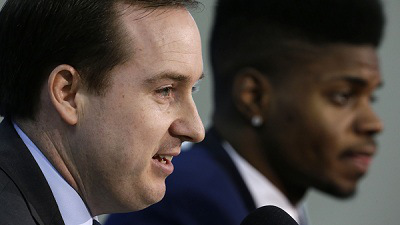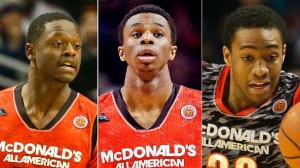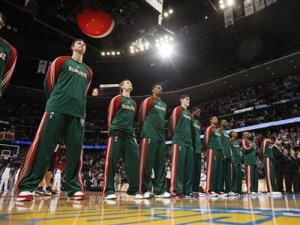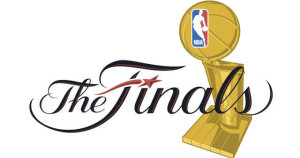Luxury in the NBA
The tanking epidemic sweeps the league

Photo by: AP
In a generation of professional sports, where superstars propel franchises to championships, it comes as no surprise that members of the National Basketball Association will do anything in their power to acquire a superstar; even if that means purposefully losing.
“Tanking,” a term coined by sportswriters, is the process of throwing away a season or two in the hopes of landing a top-flight, franchise altering superstar through the draft. For all teams not located in New York, Los Angeles, or Chicago, attracting big name players in free agency can be difficult. As a result, smaller market teams like Oklahoma City, Indiana, and Portland’s only chance of competing at a high level is by acquiring and developing talent through the draft.
Under the new NBA Collective Bargaining Agreement, also known as the CBA, a salary cap was set at $58.6 million and a luxury tax at $71.7 million for all NBA rosters. The intent of the luxury tax was to deter large market teams from garnering all the talent by heavily “taxing” rosters by the amount their roster’s salaries exceeded the luxury tax threshold. The long term effects of this agreement are still unknown, but this new luxury tax has greatly hindered small market teams – the exact opposite of what its intent was.
Oklahoma City, one of the smallest markets in professional sports, was forced to trade away home-grown, star shooting guard James Harden for fear that his contract extension would push their roster into luxury tax territory. For a large market team like the Brooklyn Nets, the luxury tax is no issue. They currently have a roster exceeding $100 million in salaries, including a luxury tax payment of $87 million dollars, a number exceeding the roster payroll of every team in the NBA outside of the Los Angeles Lakers and New York Knicks. The luxury tax has also played a large role in the “race to tank.” Under the CBA, rookie contracts are clearly defined by their pick; so top flight talent on their rookie contracts have a small salary cap hit, therefore, teams can get strong contributors at a much discounted rate.
To combat the tanking epidemic, NBA Commissioner David Stern introduced the lottery system in 1985 to partially randomize the draft order. This implementation has limited tanking to some degree but with the 2014 NBA draft class laced with franchise-altering talents such as Andrew Wiggins, Jabari Parker, and Julius Randle, throwing a season away for a top five pick can pay dividends in the long run. All fans want their favorite team to win a championship, but at what cost?
“Tanking could be effective, but there is a lottery so having the worst record in the league doesn’t guarantee a team the top pickl. It’s not exactly fair to the fans, but a franchise’s goal should be to win a championship,” said senior Mo Khatib.
Season tickets for Lakers and Knicks games can run an upwards of $100,000, so to see your team throw away a season can not only be emotionally draining, but financially as well.
“As a Lakers fan I know how much season tickets can run for, and if I was spending that much money I certainly wouldn’t want them to tank. However, with that being said, I think the Lakers are best off if they have a bad record this year and hope for the chance to draft one of the star college players this year,” said senior Khatib.
When Philadelphia 76ers general manager Sam Hinkie was hired this past summer, he was tasked with rebuilding a crumbling franchise that was left in rubble after a blockbuster trade for center Andrew Bynum went south. His first move consisted of trading budding all-star point guard, and undoubtedly the teams best player, Jrue Holliday for Nerlens Noel, a shot blocking extraordinaire fresh of season-ending ACL surgery, and an unprotected 2014 first round pick.
After Noel declared he would be unable to play during the 2013-2014 season, sports broadcasters and NBA fans alike declared the 76ers the leader in the “tank for Wiggins” race and well known NBA journalist Bill Simmons went as far as calling it “the most obvious tanking effort in NBA history.” No one within the franchise has admitted to purposefully tanking, but there is a general consensus in the Philadelphia basketball community that the 76ers are best off tanking to rebuild and hopefully compete for a championship in a few years.
“Tanking is unfair and it shows that your organization has poor spirit,” said freshman Julian Lemmond.
On the flip side of the tanking spectrum is the Milwaukee Bucks. They have not had a worse winning percentage than .313 since 2002, but they have never exceeded a win percentage of .561. The Bucks have made the playoffs five of those ten seasons but have never advanced past the first round. Because they are located in Milwaukee, the organization has a hard time attracting marquee free agents, and they have not had a franchise “star” since the early 2000’s when elite sharpshooter Michael Redd laced up in a Bucks jersey.
Their consistently average records has resulted in them picking in the middle of the draft year after year, just after most elite prospects are off the board. Every off season it seems as though the front office does just enough to remain relevant, but not enough to propel the franchise to “elite” status. This past summer they flipped shooting guard JJ Reddick for small forwardCaron Butler and two second round picks and point guard Brandon Jennings for point guard Brandon Knight and pieces, both trades are neither considered upgrades nor significant losses.
“Teams should aspire to win championships. Period,” said senior Tori Caldwell, “You have to start from the bottom to get to the top, so tanking doesn’t bother me.”
What it comes down to is whether or not an NBA team, as a professional franchise, owes it to its own integrity and to its fan base to always put forth a winning effort. However, if putting forth a winning effort constitutes barely post-average seasons year after year, could it be worth losing in the hopes of being not just good, but great someday? It is a complicated issue, and perhaps there is no uniform correct answer, but only the individual results from situational cases.




